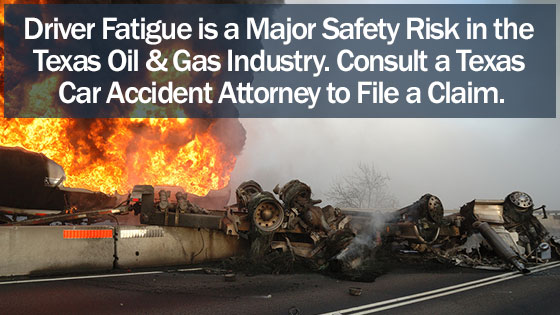Between the heavy equipment and hazardous materials, Texas oil and gas industry jobs are generally perceived as very dangerous. Contrary to popular belief, the biggest risks do not lie in working onsite. Many oil and gas fatalities happen on the road as a result of driver fatigue. Oil and gas workers are often assigned shifts that range from 8 to 12 hours each day, 7 to 14 days consecutively. Therefore, fatigue is often a factor. If you or a loved one have been injured in a car accident with an oil and gas truck you should consult a Texas car accident attorney to see if you a case.

General Texas Trucking Regulations
Most truck drivers are required to take a rest break after working a certain number of hours. In addition to having rest requirements, wait time also counts toward the driver’s work hours. For example, a driver may be required to take a break after working 11 hours. If the driver is required to wait 3 hours while his or her truck is loaded or unloaded, the three hours are included in the 11 hours. Restricting work hours and requiring rest breaks reduces the likelihood of drivers endangering themselves and others by operating large trucks while extremely fatigued.
How the Texas Oil and Gas Industry Differs
Oil and gas truck drivers in Texas operate even heavier trucks and are always transporting highly flammable materials. Therefore, it is reasonable to expect the oil and gas industry to be subjected to even stricter work and rest requirements to ensure drivers are especially well-rested. Unfortunately, that is not the case. In certain instances, fuel truck operators are allowed to operate 12 hours a day without meeting the rest break requirement. For some workers, wait time is not counted toward their work hours. Therefore, a driver who must wait an additional three hours for loading or unloading and work a 12-hour day will really work 15 hours before his or her employer is required to allow the driver to rest. Imposing more lenient rest requirements on oil and gas employers greatly increases the risk of driver fatigue for the truckers who transport volatile liquids in heavy vehicles on the highways.
Long Commutes
In addition to oil and gas workers who drive trucks as a part of their job, there are others who travel long distances between their accommodations and the work site. Although these workers do not face the same risks as those who operate large vehicles on the road, people who work onsite also clock longer hours than most industries and are more likely to be fatigued when commuting at the end of their shift.
South Texas Accidents
Though many oil and gas truck accidents are single-vehicle incidents, some trucks collide with passenger vehicles. In cases involving serious injury or fatality, the victim is more likely to be an occupant of a passenger car due to the vast difference in size. Oil rig and trucking accidents differ slightly when compared to accidents between two private vehicles because the driver’s company may be liable for the victim’s injury. Nevertheless, anyone who is injured in an accident with an oil rig worker, whether the worker was driving a commercial vehicle or a passenger car, should contact a Texas car accident attorney.
Contacting an Oil Rig Accident Attorney
For accident victims, an experienced attorney can help the injured party explore the best options for recourse. A lawyer can help the victim receive compensation for his or her physical injuries, medical expenses, and lost wages. Enlisting the help of a qualified car accident attorney is as simple as making a call. An attorney from the Law Offices of David Kohm can provide you with expert legal advice pertaining to your car accident with an oil and gas truck.
Call our law offices today at any of our convenient locations and get a free consultation.
Arlington (817) 522-4451
Denton (940) 222-4060
Dallas (972) 362-6848
Fort Worth (817) 764-1375
Cedar Hill (972) 338-9427
McKinney (469) 522-3688
Lewisville (972) 354-4605
Frisco (972) 725-7681
You can also contact us online by using our quick contact form.










